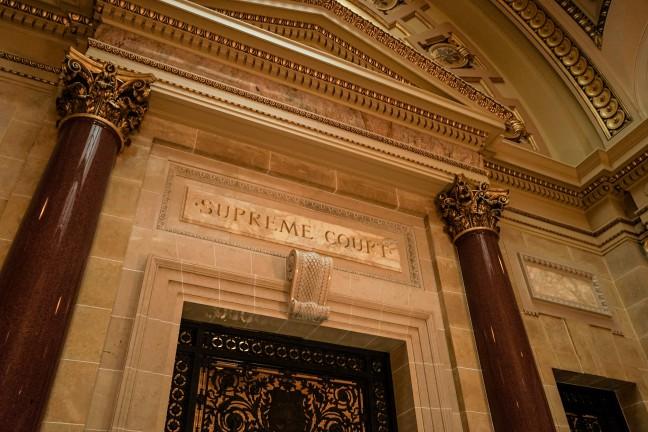Conservative Justice Daniel Kelly and liberal Justice Janet Protasiewicz will face off in the Wisconsin State Supreme Court general election next month after advancing in the primary election.
This election will be pivotal. Currently, the state’s highest court has a 4-3 conservative lean. But with conservative Justice Patience Roggensack retiring, liberals have the chance to retake control of the Supreme Court.
The ideological makeup of the court will have big ramifications. With opportunities to rule on voting rights, redistricting and abortion, the state Supreme Court’s rulings could have tangible impacts on relevant policy issues ahead of the 2024 presidential election and beyond.
Though officially nonpartisan, Kelly and Protasiewicz have each received campaign finance contributions from partisan donors and interest groups, including the Republican Party of Wisconsin and the Democratic Party of Wisconsin, respectively.
With the potential of enormous consequences to the political and social fabric of the state, money has flooded into both judicial campaigns in record amounts. Millions more are expected to surge into the election before the general election in April. According to Wisconsin Public Radio, experts predict this election will be the most expensive Supreme Court election in Wisconsin history.
The scale of campaign investment in this Supreme Court election is usually only reserved for strictly partisan elections. In the absence of stringent regulations on campaign finance, the “nonpartisan” label of Wisconsin Supreme Court elections is almost laughable.
A quick search into the financial backers of each candidate reveals an intense partisan fight led by extremely wealthy groups and individuals for control over the swing of the court.
Kelly has received over $3.4 million from the conservative political action group Fair Courts America alone, according to the Brennan Center for Justice — a campaign finance watchdog. Similarly, liberal group A Better Wisconsin Together has poured almost $2.8 million into Protasiewicz’s campaign.
Electric cars aren’t final solution for cleaner transportation
Wealthy billionaire donors from across the country have also made financial impacts on the election. According to campaign finance records, San Francisco-based Twilio CEO Jeff Lawson and ABC Supply co-founder Diane Hendricks have donated the maximum allowed amount to Protasiewicz and Kelly, respectively.
The increasingly partisan nature of “nonpartisan” judicial elections is problematic on both a theoretical and practical level.
Campaign funds from the wealthy represent a very real conflict of interest that counters the very nature of “independent” judicial review. That is, rulings based on the constitution without external influence from shifting political climates or interest groups.
With a sharp rise in the cost of campaigns, candidates face more pressure to cater to the interests of the wealthy and billionaire-funded super PACs to raise enough money to compete in elections, according to the Brennan Center.
The result is as expected — a hyper-partisan state Supreme Court. The liberal-conservative divide of Wisconsin’s Supreme Court runs deep and often along party lines. When it came time to choose voting maps for the state legislature last spring, conservative justices on the court approved a map hand-picked by the Republicans in the legislature – an overt partisan ruling.
This judicial model fails the ideal standard of a judiciary being independent and brings into question the very legitimacy of the state’s Supreme Court. With justices serving as lap dogs for political parties in the legislature, the people of Wisconsin can never be sure if the court’s rulings are solely based on constitutional interpretation or with the intent to advance partisan agendas.
Nonpartisanship on the Wisconsin Supreme Court is simply not holding up against the influences of political parties and campaign contributors, as well as an extremely politically polarized society. If an independent judiciary was ever to be enforced, Wisconsin would have to face a long path of reform.
And it’s not just Wisconsin facing this issue. Several states are beginning to experiment with switching their judicial elections from nonpartisan to partisan, or vice versa, according to the Duke University School of Law.
If Wisconsin chooses to not clean up its campaign finance regulations, it may as well ditch the official “nonpartisan” label in Supreme Court elections. The refusal to use partisan identifiers — as in statewide or national elections — cannot mask the partisan status quo of the Supreme Court.
More than just a teacher: UW Dance instructor encourages creativity, passion in studio
Banning campaign contributions from political parties would be a step toward reviving nonpartisanship in the state Supreme Court. Though donations from each party in this election are relatively insignificant so far, the principle of receiving funds from established political parties builds strong ties between supposedly nonpartisan candidates and partisan values.
Though Wisconsin law requires attribution and disclaimer for political advertisements, sources of money from wealthy outside groups like A Better Wisconsin Together are relatively hard to trace.
Banning enormous contributions like these would prove tricky, thanks to the Citizens United v. FEC Supreme Court ruling in 2010 that prohibited the government from limiting independent expenditures from outside groups. But financial regulations could still be reformed to demand greater financial transparency.
The people of Wisconsin deserve to know the people responsible for pumping millions into our elections. Expanding transparency in election finance would further expose partisan forces in “nonpartisan” elections and help the state rehabilitate an independent judiciary.
Jack Rogers ([email protected]) is a freshman studying Chinese and economics.





















